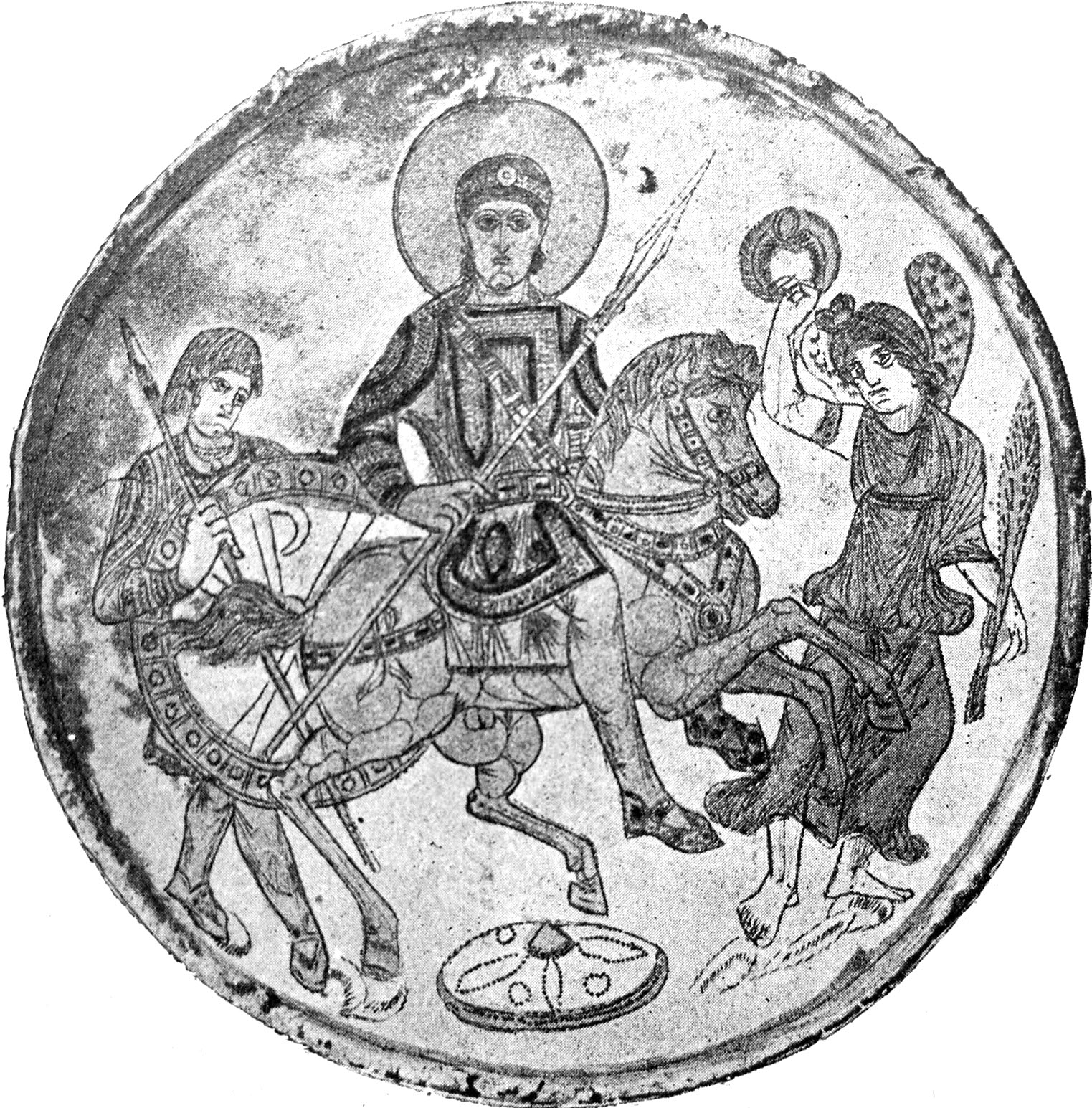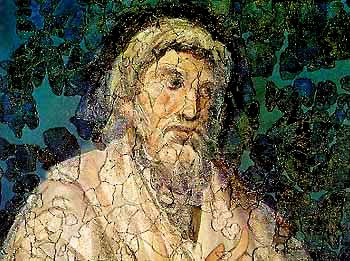|
Chirho
The Chi Rho (☧, English pronunciation ; also known as ''chrismon'') is one of the earliest forms of Christogram, formed by superimposing the first two (capital) letters— chi and rho (ΧΡ)—of the Greek word ( Christos) in such a way that the vertical stroke of the rho intersects the center of the chi. The Chi-Rho symbol was used by the Roman Emperor Constantine I (r. 306–337 AD) as part of a military standard (vexillum). Constantine's standard was known as the Labarum. Early symbols similar to the Chi Rho were the Staurogram () and the IX monogram (). In pre-Christian times, the Chi-Rho symbol was also used to mark a particularly valuable or relevant passage in the margin of a page, abbreviating ''chrēston'' (good). Some coins of Ptolemy III Euergetes (r. 246–222 BC) were marked with a Chi-Rho. Although formed of Greek characters, the device (or its separate parts) is frequently found serving as an abbreviation in Latin text, with endings added appropriate to ... [...More Info...] [...Related Items...] OR: [Wikipedia] [Google] [Baidu] |
Simple Labarum2
Simple or SIMPLE may refer to: *Simplicity, the state or quality of being simple Arts and entertainment * ''Simple'' (album), by Andy Yorke, 2008, and its title track * "Simple" (Florida Georgia Line song), 2018 * "Simple", a song by Johnny Mathis from the 1984 album '' A Special Part of Me'' * "Simple", a song by Collective Soul from the 1995 album ''Collective Soul'' * "Simple", a song by Katy Perry from the 2005 soundtrack to ''The Sisterhood of the Traveling Pants'' * "Simple", a song by Khalil from the 2017 album ''Prove It All'' * "Simple", a song by Kreesha Turner from the 2008 album '' Passion'' * "Simple", a song by Ty Dolla Sign from the 2017 album '' Beach House 3'' deluxe version * ''Simple'' (video game series), budget-priced console games Businesses and organisations * Simple (bank), an American direct bank * SIMPLE Group, a consulting conglomeration based in Gibraltar * Simple Shoes, an American footwear brand * Simple Skincare, a British brand of so ... [...More Info...] [...Related Items...] OR: [Wikipedia] [Google] [Baidu] |
Dative
In grammar, the dative case ( abbreviated , or sometimes when it is a core argument) is a grammatical case used in some languages to indicate the recipient or beneficiary of an action, as in "Maria Jacobo potum dedit", Latin for "Maria gave Jacob a drink". In this example, the dative marks what would be considered the indirect object of a verb in English. Sometimes the dative has functions unrelated to giving. In Scottish Gaelic and Irish, the term ''dative case'' is used in traditional grammars to refer to the prepositional case-marking of nouns following simple prepositions and the definite article. In Georgian and Hindustani (Hindi-Urdu), the dative case can also mark the subject of a sentence.Bhatt, Rajesh (2003). Experiencer subjects. Handout from MIT course “Structure of the Modern Indo-Aryan Languages”. This is called the dative construction. In Hindi, the dative construction is not limited to only certain verbs or tenses and it can be used with any verb in any te ... [...More Info...] [...Related Items...] OR: [Wikipedia] [Google] [Baidu] |
Battle Of The Milvian Bridge
The Battle of the Milvian Bridge took place between the Roman Emperors Constantine I and Maxentius on 28 October 312. It takes its name from the Milvian Bridge, an important route over the Tiber. Constantine won the battle and started on the path that led him to end the Tetrarchy and become the sole ruler of the Roman Empire. Maxentius drowned in the Tiber during the battle; his body was later taken from the river and decapitated, and his head was paraded through the streets of Rome on the day following the battle before being taken to Africa. According to Christian chroniclers Eusebius of Caesarea and Lactantius, the battle marked the beginning of Constantine's conversion to Christianity. Eusebius of Caesarea recounts that Constantine and his soldiers had a vision sent by the Christian God. This was interpreted as a promise of victory if the sign of the Chi Rho, the first two letters of Christ's name in Greek, was painted on the soldiers' shields. The Arch of Constantine, erec ... [...More Info...] [...Related Items...] OR: [Wikipedia] [Google] [Baidu] |
Maxentius
Marcus Aurelius Valerius Maxentius (c. 283 – 28 October 312) was a Roman emperor, who reigned from 306 until his death in 312. Despite ruling in Italy and North Africa, and having the recognition of the Senate in Rome, he was not recognized as a legitimate emperor by his fellow emperors. He was the son of former Emperor Maximian and the son-in-law of Emperor Galerius. The latter part of his reign was preoccupied with civil war, allying with Maximinus against Licinius and Constantine. The latter defeated him at the Battle of the Milvian Bridge in 312, where Maxentius, with his army in flight, purportedly perished by drowning in the Tiber river. Maxentius was the last emperor to permanently reside in Rome. He attempted to embellish, restore and improve the ancient capital, carrying out important building works, including the Temple of the Divine Romulus (dedicated to his deceased son), the Basilica of Maxentius, which was completed by Constantine, the villa and the circ ... [...More Info...] [...Related Items...] OR: [Wikipedia] [Google] [Baidu] |
Shield
A shield is a piece of personal armour held in the hand, which may or may not be strapped to the wrist or forearm. Shields are used to intercept specific attacks, whether from close-ranged weaponry or projectiles such as arrows, by means of active blocks, as well as to provide passive protection by closing one or more lines of engagement during combat. Shields vary greatly in size and shape, ranging from large panels that protect the user's whole body to small models (such as the buckler) that were intended for hand-to-hand-combat use. Shields also vary a great deal in thickness; whereas some shields were made of relatively deep, absorbent, wooden planking to protect soldiers from the impact of spears and crossbow bolts, others were thinner and lighter and designed mainly for deflecting blade strikes (like the roromaraugi or qauata). Finally, shields vary greatly in shape, ranging in roundness to angularity, proportional length and width, symmetry and edge pattern; differen ... [...More Info...] [...Related Items...] OR: [Wikipedia] [Google] [Baidu] |
Crispus
Flavius Julius Crispus (; 300 – 326) was the eldest son of the Roman emperor Constantine I, as well as his junior colleague ( ''caesar'') from March 317 until his execution by his father in 326. The grandson of the ''augustus'' Constantius I, Crispus was the elder half-brother of the future ''augustus'' Constantine II and became co-''caesar'' with him and with his cousin Licinius II at Serdica, part of the settlement ending the Cibalensean War between Constantine and his father's rival Licinius I. Crispus ruled from Augusta Treverorum (Trier) in Roman Gaul between 318 and 323 and defeated the navy of Licinius I at the Battle of the Hellespont in 324, which with the land Battle of Chrysopolis won by Constantine forced the resignation of Licinius and his son, leaving Constantine the sole ''augustus'' and the Constantinian dynasty in control of the entire empire. It is unclear what was legal status of the relationship Crispus's mother Minervina had with Constantine; Crispus m ... [...More Info...] [...Related Items...] OR: [Wikipedia] [Google] [Baidu] |
Constantine The Great
Constantine I ( , ; la, Flavius Valerius Constantinus, ; ; 27 February 22 May 337), also known as Constantine the Great, was Roman emperor from AD 306 to 337, the first one to convert to Christianity. Born in Naissus, Dacia Mediterranea (now Niš, Serbia), he was the son of Flavius Constantius, a Roman army officer of Illyrian origin who had been one of the four rulers of the Tetrarchy. His mother, Helena, was a Greek Christian of low birth. Later canonized as a saint, she is traditionally attributed with the conversion of her son. Constantine served with distinction under the Roman emperors Diocletian and Galerius. He began his career by campaigning in the eastern provinces (against the Persians) before being recalled in the west (in AD 305) to fight alongside his father in Britain. After his father's death in 306, Constantine became emperor. He was acclaimed by his army at Eboracum ( York, England), and eventually emerged victorious in the civil wars against ... [...More Info...] [...Related Items...] OR: [Wikipedia] [Google] [Baidu] |
North Africa
North Africa, or Northern Africa is a region encompassing the northern portion of the African continent. There is no singularly accepted scope for the region, and it is sometimes defined as stretching from the Atlantic shores of Mauritania in the west, to Egypt's Suez Canal. Varying sources limit it to the countries of Algeria, Libya, Morocco, and Tunisia, a region that was known by the French during colonial times as "''Afrique du Nord''" and is known by Arabs as the Maghreb ("West", ''The western part of Arab World''). The United Nations definition includes Morocco, Algeria, Tunisia, Libya, Egypt, Sudan, and the Western Sahara, the territory disputed between Morocco and the Sahrawi Republic. The African Union definition includes the Western Sahara and Mauritania but not Sudan. When used in the term Middle East and North Africa (MENA), it often refers only to the countries of the Maghreb. North Africa includes the Spanish cities of Ceuta and Melilla, and plazas de so ... [...More Info...] [...Related Items...] OR: [Wikipedia] [Google] [Baidu] |
Latin
Latin (, or , ) is a classical language belonging to the Italic branch of the Indo-European languages. Latin was originally a dialect spoken in the lower Tiber area (then known as Latium) around present-day Rome, but through the power of the Roman Republic it became the dominant language in the Italian region and subsequently throughout the Roman Empire. Even after the fall of Western Rome, Latin remained the common language of international communication, science, scholarship and academia in Europe until well into the 18th century, when other regional vernaculars (including its own descendants, the Romance languages) supplanted it in common academic and political usage, and it eventually became a dead language in the modern linguistic definition. Latin is a highly inflected language, with three distinct genders (masculine, feminine, and neuter), six or seven noun cases (nominative, accusative, genitive, dative, ablative, and vocative), five declensions, four verb conjug ... [...More Info...] [...Related Items...] OR: [Wikipedia] [Google] [Baidu] |
Lactantius
Lucius Caecilius Firmianus Lactantius (c. 250 – c. 325) was an early Christian author who became an advisor to Roman emperor, Constantine I, guiding his Christian religious policy in its initial stages of emergence, and a tutor to his son Crispus. His most important work is the '' Institutiones Divinae'' ("The Divine Institutes"), an apologetic treatise intended to establish the reasonableness and truth of Christianity to pagan critics. He is best known for his apologetic works, widely read during the Renaissance by humanists, who called Lactantius the "Christian Cicero". Also often attributed to Lactantius is the poem '' The Phoenix'', which is based on the myth of the phoenix from Egypt and Arabia. Though the poem is not clearly Christian in its motifs, modern scholars have found some literary evidence in the text to suggest the author had a Christian interpretation of the eastern myth as a symbol of resurrection. Biography Lactantius was of Punic or Berber origin, born ... [...More Info...] [...Related Items...] OR: [Wikipedia] [Google] [Baidu] |





